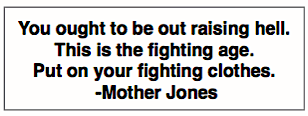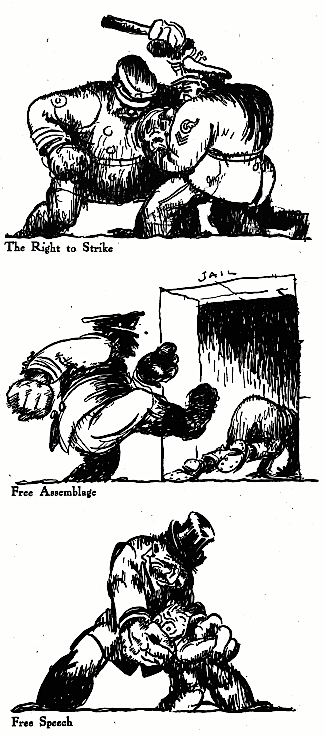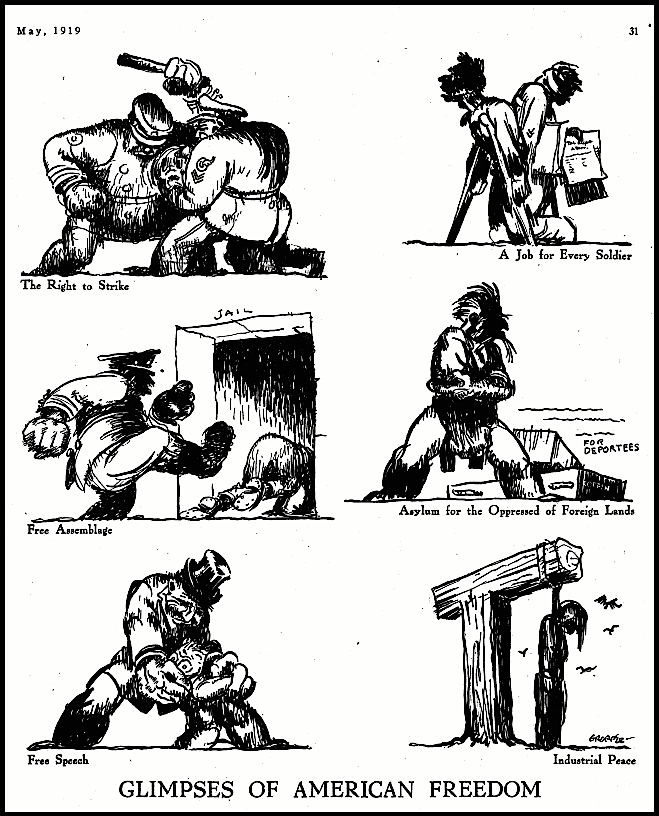 ———-
———-
Hellraisers Journal – Thursday May 22, 1919
Lawrence, Massachusetts – Textile Strikers Stand Firm
From The Liberator of May 1919:
The Lawrence Strike
[by Ruth Pickering]
THE causes of the Lawrence strike are the most elemental in the whole history of the labor movement. It is a struggle simply for a living wage. But the “law and order” fraternity are doing their best to bring on what they so much fear-a revolution. Partly as an excuse for breaking the strike, partly out genuine nervousness, they are attempting to obscure the primary issues in the fog of “Bolshevism.” And the more they advertise the revolution as something which they hate, as something so manifestly dangerous to them, the more do the workers wonder: “If they hate this thing so-whatever it is-it must have something in it for us.” Fear of Bolshevism and memories of 1912 have made the Lawrence citizens and the press applaud all repressive measures. Mounted police have been imported from Lynn, and stray recruits have been added which cost the city 3,000 extra dollars per week to maintain. Their horses are scrawny and rickety and they ride with some difficulty, but what pride they lose in their consciousness of these facts, they take out on the pickets.
Men come in from the picket-line with their heads cut open and blood covering their shirt fronts. That the strikers have a legal right to maintain the picket-line is out of the question. Liberty has come to be a joke. There is no law for the “damned Bolshevik foreigner.” The brave mounted police ride up on the sidewalk cursing and swinging their sticks. The pickets retreat before these onslaughts-but they will never forget.
The business is particularly nasty because, instead of being in an outlying district, the picket line is the main street of the town. The merchants will in time be sick of the blood smearing their door-steps; the guards are overdoing it. Lawrence is beginning to squirm under the publicity it is getting-and besides, these police cost money and the city’s funds are low. Business men may sit solemnly at a Chamber of Commerce dinner and chant:
“0, there is a little city on the old Merrimac,
The smallest in area of any on the map,
It turns more spindles early and late,
It’s the best little city in the Old Bay State.
(Chorus) The best little city in the Old Bay State,
The best little city in the Old Bay State. . . . etc.But this is sorry comfort to them. Something is rotten there, and they are inclining more and more to wonder why the mill-owners don’t’ come, around and look into their own affairs.
Meanwhile the strikers are counteracting brutality with non-resistance, and they are insisting on arbitration while the employers steadfastly refuse. The workers have nothing to lose by arbitration; they have struck for something more than starvation pay and for recognition of collective bargaining. The employers are indifferent absentee-owners, and are still unfriendly competitors, and the employes are in the majority unskilled and unable to speak English. Less primitive industrial conditions on both sides might better resist the modern Bolshevist wave.
The strike, however, as it came, was inevitable. Toward the end of January the United Textile Workers of the American Federation of Labor sent organizers out through the mills to agitate the eight-hour day, deferring the wage question. In the American Woolen Mills of Lawrence, the bosses countered this demand by slipping into the pay envelope of each employe the question: “Do you really want the eight-hour day with the necessary wage reduction?” The Italians, Russians, Germans, Lithuanians, Jews, Ukranians and Poles-18 different nationalities-realized simultaneously what the A. F. of L. had done. They quit work en masse-probably 20,000 of them. To cut their miserable pay further was to starve them. They organized immediately along national lines, sent their delegates to the Central Labor Council and outvoted the old-line labor leaders. Their new demands are for a forty-eight hour week with fifty-four hours’ pay-“48-54.” The United Textile Workers washed its hands of such outrageous greed, and the A. F. of L. withdrew-never to be heard of more in Lawrence or throughout the textile industry elsewhere. Only Bramhall of the carpenters’ union, out of the entire Central Labor Committee, stayed with the strikers, which will mean of course excommunication for him. He is now the able chairman of the strike-committee.
However, just as the original causes of the strike are lost to the public in the Bolshevik hysteria, so do the men and women workers seem to regard their immediate demands as a comparatively uninteresting though important step. For it is amazing to feel the calm confidence among all these races, that although this slow business of asking from employers more pay and shorter hours has to be endured so long as they are starving, some day there will come an end. In their meetings one gets the impression that it is not the mere attainment of their present purposes for which they have come together-but for something else. Lenin, [Karl] Liebknecht: and Karl Marx look down from the walls of their labor halls. One Big Union is the banner they fly. When they congregate, every nationality, every day-they open and close the meetings with the singing of the Internationale. The Italians have a new song, to a Salvation Army tune. They take off their hats as they sing it and a loud cheer goes up when they are done:
Vittoria di bolsceviki
del mondo liberta’,
daremo un vero fine
a chi in ozio sta!Il bolscevika
qual fior di luce
che ci conduce
in liberta’.Had the employers any prudence, they would not hesitate to grant the modest request for a forty-eight hour week with fifty-four hours’ pay, for while they hesitate the people brood, and sing, and become part of the prophetic soul of the wide world dreaming of things to come. They seem to have behind them and working through them an inevitable evolutionary force, controlling every gesture which they make.
But there are several influences at work, which were not operating in 1912, to make this strike of the Lawrence workers somewhat negative in character. For one thing, although the strike was inevitable at the threat of lowered pay, some workers feel that they are locked out also because of extremely slack times. This, in some circles, takes the edge off their sense of power. In the second place, they lack inspiring leaders of their own class. Prominent in the councils of the strikers are three enlightened ministers of the gospel, who visited Lawrence while the trouble was brewing and have been at hand ever since. They are A. J. Muste, Harold Rotzel and Cedraic Long. While willingly accepting the gospel of the revolution, they have put the emphasis of their advice upon non-resistance to police attacks.
They have tried, however, to secure publicity for the police outrages upon strikers, and have worked hard to build up the morale of the strike. They have assisted in the formation of a union the Amalgamated Textile Workers-which promises to endure if the strike is won. They have given the strikers, through soup kitchens and relief distribution generally, an education in co-operative action. It is difficult to tell how things might have gone under a different stimulus. Some, remembering Bill Haywood, regret the old days, and say that the strikers lack revolutionary flame which would enable them to hold out over a long period. The Syrian delegate in our committee meeting says, for instance: “We can’t get our men to go out on the picket line and have their heads broken for this. But start the revolution and we’ll be with you.”
The third factor, which has within it the strongest positive influence, has also its negative effect. That is Europe. These foreigners are turning their faces eastward for relief. There, their work is half accomplished for them. Why bother to change America? They look to Europe now as they used to look to America-as the home of the free. They want to go home. The Russians, Lithuanians, Italians and Poles have voluntarily appealed to the federal government to open the ports for them. The Syrian is reminded of his walks to the blue sea between high rocks of white marble; the Italian remembers that olives fall to the ground, to be picked up dead ripe, and fruits so plentiful that ten cents a day is enough to live on.
The Russian is inexpressibly eager to become a member of the Soviet at home. Here in Lawrence, they are constantly called “damned foreigners,” and Americanization is stuffed down their throats when they hate America. When they were called upon to buy bonds during the war, or do Red Cross work-then they were not called foreigners. And if they did it with some hope of gratitude, they have since learned that all they get in return is blasphemy, low pay, tremendous food prices and raised rents. Now their Liberty Bonds are fast being turned over to the strike fund. “What’s the use of hanging on to them?” they say. “When the Revolution comes–!”… America seems to be urging them to leave the country, and they want to leave.
Nevertheless there is little doubt that they will hang on until their demands are largely met, though it means untold hardship. They cannot afford to do otherwise. And in any event, progress has been made. In the first place, it is an industrial strike. Conservative trade unionism has so betrayed the workers in Lawrence that it can hardly be revived there. Unfortunately, perhaps, negotiations with the Amalgamated Clothing Workers partially failed. It seemed impracticable to ally with them, because some of the leaders are suspicious after their former treatment at the hands of the A. F. of L. But the strikers are getting material assistance from the clothing workers, and after the formation of their union, the Amalgamated Textile Workers, some alliance with the older branch may result. Though the I. W. W. has disappeared in form, its tradition remains.
Moreover, the various nationalities, in spite of the recrudescence of chauvinism since the war, are working in greater harmony. Under the doctrines of the working class movement, the Poles are amicably dealing with the Russians; Franco-Belgians and Germans picnic together. The leaders have learned to speak English, and the general strike committee meetings and the relief committee meetings are conducted in that as a common language. It is, of course, still impossible to arouse large groups to enthusiasm in any language except their own, but intermingling and common sympathy are growing more apparent. National barriers are thus breaking down, and so also are the stultifying and separatist barriers erected by their various churches. The strikers know that the Italian church at Lawrence, for instance, is subsidized by a director of one of the mills, and they report that if the priest can get the workers to return to their looms he will receive an additional $50,000. The Catholic father is too blatantly opposed to the strike demands. And no strike today which lasts as this one has lasted into its third month-can fail to be an intensive school of revolutionary theory and practice. These men and women are learning fast.
In the meantime, 20,000 workers are out of a job. They were obliged to quit in the slack season. When they were in the mills their average weekly wage was about $15. They have not been able to save money to keep them on strike. So far the employers have refused to arbitrate, and the state has refused to intervene on their behalf. Relief is now costing $15,000 a week. They need help from the entire working class. Since their union has been only recently formed they have no benefit funds. And unless they win this strike they will probably be unable to regain their old jobs, the labor movement will lose an industrial union, and a stronghold of revolutionary faith will become scattered and ineffectual.
RUTH PICKERING.
[Drawing and emphasis added.]
—————
[From page 31:]
~~~~~~~~~~~~~~~~~~~~~~
SOURCES & IMAGES
Quote Mother Jones Raising Hell, NYT p1, Oct 6, 1916
Mother Jones Speaks to Women Relatives of Car Strikers, Blamed for Riot
The Liberator Internet Archive
https://www.marxists.org/history/usa/culture/pubs/liberator/
The Liberator
(New York, New York)
-May 1919
https://www.marxists.org/history/usa/culture/pubs/liberator/1919/05/v2n05-may-1919-liberator.pdf
See also:
Tag: Lawrence Textile Strike of 1919
https://weneverforget.org/tag/lawrence-textile-strike-of-1919/
A Tale of Three Cities:
Labor Organization and Protest in Paterson, Passaic, and Lawrence, 1916-1921
-by David J. Goldberg
Rutgers University Press, 1989
https://books.google.com/books?id=9s11QgAACAAJ
Ruth Pickering
https://en.wikipedia.org/wiki/Ruth_Pickering_Pinchot
Karl Liebknecht
https://en.wikipedia.org/wiki/Karl_Liebknecht
Karl Liebknecht and Rosa Luxemburg: Last Hours
https://www.marxists.org/history/international/comintern/sections/britain/periodicals/communist_review/1924/09/last_hours.htm
~~~~~~~~~~~~~~~~~~~~~~~~~~~~~~~~~~~~~~~~~~~~~
Internationale – Italian


